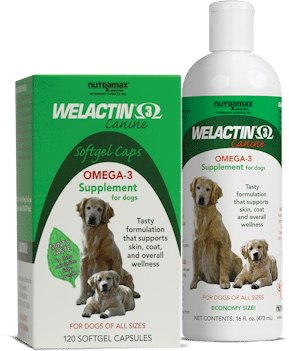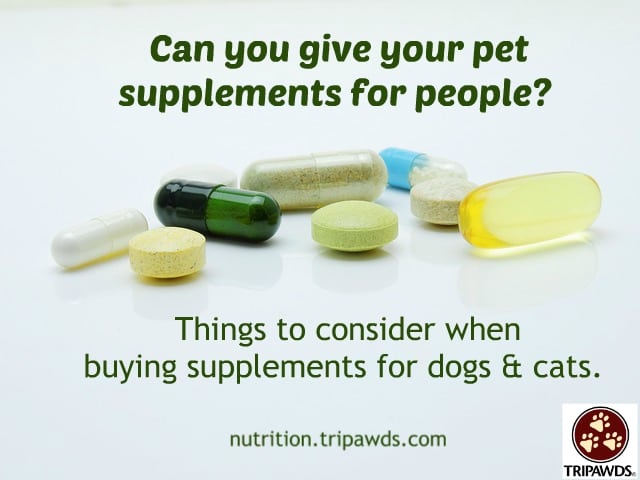Have you ever wondered about the difference in health supplements for pets versus people? Is it safe to give your pet people supplements? What makes one brand of fish oil only for pets, and another OK for people to use? The answer is yes, and no. Here’s what to look for and what to avoid in supplements for your dog or cat.
When It’s OK to Give Your Pet People Supplements (and When It’s Not)
Recently in the Eating Healthy Tripawds Discussion Forum in a discussion about fish oil, yaya asked a great question:
What’s different from the ones for human?
Turns out, it’s what’s added to the supplements that really matters. Pets and people have different dietary needs and tolerances. Many supplements and vitamins for people have extra additives that are not safe for pets. When Tripawds Spokesdog Wyatt Ray was prescribed fish oil by his veterinarian at Colorado State University, we were told:
“We recommend using a veterinary product to avoid dangerous additives such as xylitol or vitamin D.”

Note: this post contains Amazon affiliate links. When you buy anything on Amazon after clicking these links, Tripawds receives a small commission that helps offset the cost of keeping our community online.
Our vet’s recommendation opened our eyes to the difference between supplements for pets and those for people. Veterinarian Dr. Jason Nicholas concurs with our vet. In his podcast, “What’s Up with Supplements?” he says:
“I typically recommend going with the veterinary formulations, just because you know that you’re less likely to run into problems with ingredients that shouldn’t be there. . .”
Another reason why buying pet-safe supplements is a good idea is because dosing is so much easier, he says.
“. . . in the veterinary formulations, that concentration of the supplement is oftentimes easier to dose than it would be if you find a human produced one, produced for people.”
Ingredients to Avoid in Pet (and People) Supplements
Of course, there are some exceptions. Even Dr. Nicholas says that some human supplements like fish oil can be safe for pets. However, as we just discovered, you really want to avoid “Excipients.” These are added fillers, binders, coloring agents and preservatives commonly included in supplements for pets and people alike. The Dogs Naturally article “What Are Fillers And Binders (And Why They Shouldn’t Be In Your Dog’s Supplements)” goes into greater detail and discusses what excipients are, and why you should avoid supplements containing:
Fillers
Binders
Disintegrates
Lubricants
Sweeteners
Flavorings
Coloring Agents
Coating Agents
Preservatives
Emulsifiers
Detergents
Gums and Resins
Surfactants
Bulking Agents
Dispersing and Suspending agents
Oxidants
Take a minute to read the Dogs Naturally article and wrap your head around the many unnecessary and often hidden ingredients in supplements that are supposed to make us healthier. Scary, isn’t it?
Pet-Safe Supplement Brands
For now, we’ll stick with the Wellactin For Dogs that our vet recommended, as well as our other favorite pet-safe supplement brands like Dr. Mercola and Only Natural Pet.
How about you? What are some of your favorite pet supplement brands that you trust? Share them in the comments below, we’d love hear from you.



My tripawd Abby is on over 40 different holistic supplements to try to beat this damn cancer. I buy them from Swanson Vitamins. She is roughly have the size of me so I base the dosing on half of the recommended dose or per my Veterinarian’s directions. Swanson’s website often has good deals and they are quality human grade supplements. She was given 6 months and that was 20 months ago. I dont know if the supplements are why she is still going strong but i always believe “if it aint broke dont fix it”.
Abby is so fortunate to have you for a mom, Amber! We are happy to hear things are good, may she have many hoppy years ahead of her!